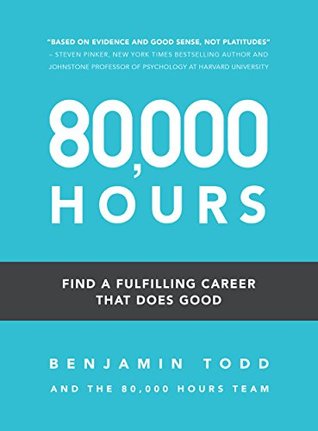80,000 Hours, and Why We’re All Murderers

80,000 Hours is a non-profit organization with the stated goal “to help as many people as possible lead high-impact careers.” The website’s content boils down to career advice for young people looking to do as much good in their working lives as possible. I don’t believe them to be a definitive or impartial authority on the topic – they have their biases, and make their claims based on certain subjective views. I do, however, believe that they represent an interesting worldview and a philosophy that seems to be on the rise. Even if you don’t plan to devote your career to maximizing human wellbeing, it’s still a solid career advice site, and a valuable guidepost if you’re stuck in the strange limbo of thinking about your future and having no clue about anything. Hopefully, by the end of this article, I’ll have convinced you to take a peek at 80000hours.org. And who knows? Perhaps you’ll join the 3000 people who have already made major career plan changes because of the site.
The core of 80,000 Hours is the idea that a successful career is one that has made the most difference in improving the total wellbeing of the people of Earth. While that may seem like a lofty goal, the eponymous 80,000 hours represents the average amount of time a person will work in their lifetime. The site tends to take this kind of holistic viewpoint, which I find quite useful. When viewed holistically, it becomes clear that if directed correctly, 80,000 hours of work could make quite a bit of difference. This is especially so if a focus on maximizing net wellbeing is taken early, and not adopted halfway through those 80,000 hours as an awkward career pivot.
Since this is such a fundamental tenet of the organization, I will take a moment to defend it and add my own two cents, so that anyone who doesn’t agree with this will at least have something to think about, and maybe a reason not to click away. The site argues that according to over 60 studies they’ve reviewed (which you can take a look at in Part 1 of their Career Guide), the most fulfilling careers are not those that are easy and high paying, but rather those that you’re good at and that help others, assuming there are no major detractors such as hostile workplace culture or a crushing workload. There is plenty of other evidence for this in their article that I won’t bother to regurgitate here.
While fulfilling work is all well and good, I’d like to add my own argument. I believe directing one’s career in this way is a moral responsibility. To make my point, I will co-opt a little bit of basic economics – a concept called opportunity cost. Opportunity cost refers not to value lost, but to value left un-gained. For example, an hour spent loafing in front of a TV is an hour that could have been spent doing something else. Just to put a number on it, I’ll assume minimum wage, and we can say that hour of TV “cost” $7.25, since you now have $7.25 less than you would have otherwise. Value left un-gained is equated to value lost. Now from there it’s a bit of a leap, but imagine if instead of working minimum wage, our hypothetical TV watcher could have been volunteering as an EMT, or could have donated those $7.25, and could have saved a life in that hour. To me, in the same way that $7.25 left un-earned is $7.25 lost, a life that could have been saved but was left unsaved is effectively a murder by inaction. Multiply that by 80,000 hours, and I see a pretty compelling reason to work towards the greater good. How many people’s lives do you think you could save if you worked at it for 80,000 hours? And are you willing to kill all of those people, so you can buy yourself a Ferrari with your Wall Street money?
Now that I’ve hopefully convinced you that maximizing human wellbeing is a worthwhile goal and maybe given you something to think about, I’ll move on to the resources available to this end. The site includes a ranked list of what they believe are the highest-impact global problems to work on, based on Scale, Solvability and Neglect – how big the problem is, how easy or hard it is to make progress, and how much work is already being done on it. This is expanded upon in a rather detailed career direction guide, which is broken up into 12 topic-centered sections. Each section addresses a different facet of how to optimize your future career to do the best. The goal of the guide is to help you consider which problem would be best for you to tackle, based on how effective your individual attributes would make you towards solving various problems. They have a quiz you can take, which takes into account where your talents and interests lie, recommending options for the best career path to look into. They have profiles of specific career paths, majors, and degrees, based on a variety of factors that can impact potential for good.
I’ve found this to be an incredibly useful site. It provides an interesting philosophy and a justification for it. It has tons of useful tools and resources. It takes a very holistic worldview. It uses a very clear rational process to arrive at its conclusions and makes the details of that process available to anyone who cares to investigate what their biases may be. I highly recommend it – perhaps not as an absolute authority, but certainly as a voice to consider.





